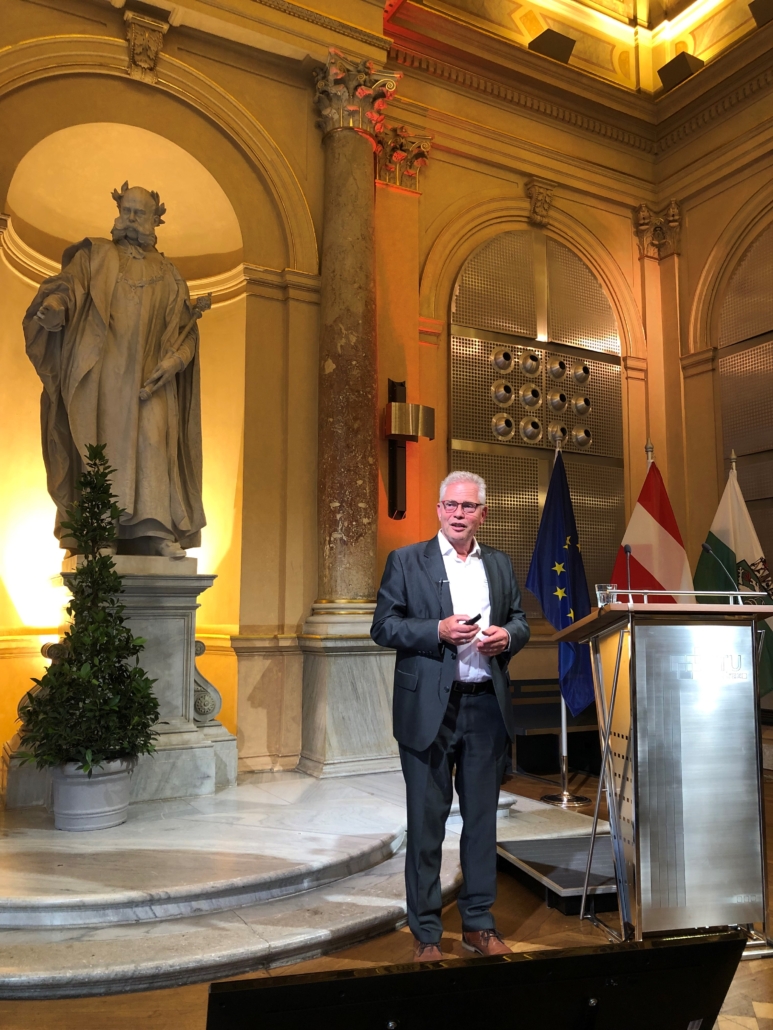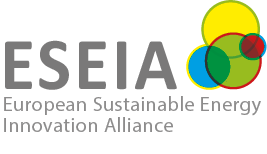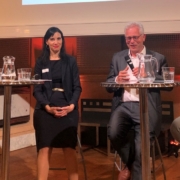ESEIA Lecture Series: Fourth Lecture Addresses Challenges and Opportunities of Circular Economy
On 25 May 2023, we continued our mission of promoting insightful discussions and encouraging positive transformations, holding another ESEIA Lecture Series event! Over 30 attendees from 8 countries joined us in person in Graz and online to discuss the circular economy and discover innovative green technologies.
Titled Circular Bio-Based Systems: metabolon From Theory to Practice, the fourth lecture took place at the Auditorium (Aula) of Graz University of Technology (TU Graz) from 19:00 to 21:00 CEST. This lecture is part of the hybrid series – Sustainable Energy Innovation Systems for Climate Neutrality – organised by ESEIA in cooperation with TU Graz since October 2022.
The session started with the opening remarks by the ESEIA President and Rector of TU Graz Harald Kainz, and the ESEIA Director Brigitte Hasewend, who welcomed the attendees and highlighted the importance of events such as the ESEIA Lecture Series in promoting knowledge exchange and facilitating ongoing dialogue on the transition to climate neutrality.
Then, the Professor Emeritus at the Institute of Process and Particle Engineering at TU Graz Michael Narodoslawsky, who chaired the event, introduced the topic and the panel of speakers. The line-up included experts from various fields, bringing unique insights and perspectives on the circular economy:
- Michael Bongards, Professor at TH Köln – University of Applied Sciences, Germany;
- Alexandra Loidl, Director of Waste Management of the City of Graz;
- Christian Schreyer, CEO of the Umbrella Organisation of Styrian Waste Management Associations.
During his lecture, Professor Michael Bongards provided a comprehensive overview of how the research and innovation centre :metabolon bridges the gap between scientific research and practical implementation in waste management and recycling technology.
He also showcased examples of how the centre integrates various research disciplines (e.g., engineering, chemistry, sociology) and leverages existing infrastructure (e.g., industrial and pilot scale biogas plant, process water treatment plant) to find new ways of processing residual and waste materials and contributing to a more circular economy. One of the examples was the collaborative effort between :metabolon, Schwalbe and Pyrum Innovations Ag in developing the Schwalbe Recycling System for used bicycle tires.
He concluded with a note on interdisciplinary research and new emerging technologies. “I see a lot of future in new technologies combining chemical and biological technologies such as dark fermentation for the production of hydrogen,” he said.

Following Professor Michael Bongards’s lecture, Alexandra Loidl offered a glimpse into what a circular economy at a city level looks like. She explained how the City of Graz is implementing circular economy strategies, giving examples of concrete measures from waste prevention and collection to recycling and alternative consumption (e.g., Ressourcenpark).
Then, Christian Schreyer took the opportunity to shed light on waste in Styria, highlighting key challenges to its effective management and solutions to improve the municipal waste collection system (e.g., pay-as-you-throw).
The session concluded with a lively and engaging discussion among the attendees. The key takeaway is that implementing a fully circular economy and closing the loop will be a journey that requires collective effort and participation from all stakeholders.
Thank you to the speakers, the participants, the chair Michael Narodoslawsky, the host Harald Kainz, and all those who have contributed to making this event a success! We look forward to seeing you again soon!
Upcoming lecture: Water-Energy-Food-Ecosystems
The fifth lecture in this series will be delivered on 22 June 2023 by the Director of Energy, Environment and Water Research Centre (EEWRC) at The Cyprus Institute Fadi Comair and will focus on the role Water, Energy, Food, and Ecosystems Nexus approach plays in ensuring resilient, circular and green economies.
During the lecture, titled Water-Energy-Food-Ecosystems in Sustainable Communities in the EU and Africa, our guest lecturer will address the challenges posed by climate change and growing populations, explaining how science diplomacy can advance co-development in the EU and African communities.
Two respondents will join the discussion: the Managing Director at Benin National Rural Water Supply Agency (ANAEPMR) and National Water Company of Benin (Soneb) Sylvain Migan, who will discuss the case of the West African Republic of Benin, and the Senior Scientist at the Institute of Landscape Development, Recreation and Conservation Planning at the University of Natural Resources and Life Sciences, Vienna (BOKU) Thomas Schauppenlehner, who will present a novel assessment tool for local-global WEFE interactions (Glocull project).
The Professor at the Institute of Urban Water Management and Landscape Water Engineering at Graz University of Technology Daniela Fuchs-Hanusch chairs the lecture.
The lecture is free and open to all interested stakeholders. Register here to attend!
More information about ESEIA Lecture Series on Sustainable Energy Innovation Systems for Climate Neutrality is available here.
Contact:
ESEIA Team: office@eseia.eu


